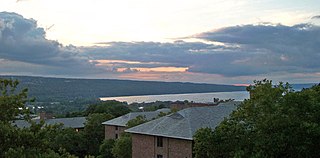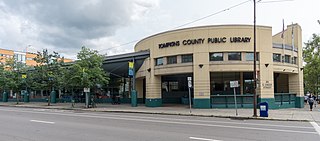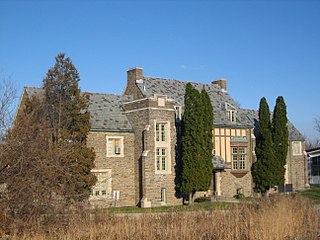
Cayuga Lake is the longest of central New York's glacial Finger Lakes, and is the second largest in surface area and second largest in volume. It is just under 39 miles (63 km) long. Its average width is 1.7 miles (2.8 km), and it is 3.5 mi wide (5.6 km) at its widest point, near Aurora. It is approximately 435 ft deep (133 m) at its deepest point, and has over 95 miles (153 km) of shoreline.

Ithaca is a city in and the county seat of Tompkins County, New York, United States. Situated on the southern shore of Cayuga Lake in the Finger Lakes region of New York, Ithaca is the largest community in the Ithaca metropolitan statistical area. It is named after the Greek island of Ithaca. As of 2020, the city's population was 32,108.

Tompkins County is a county located in the U.S. state of New York. As of the 2020 census, the population was 105,740. The county seat is Ithaca. The name is in honor of Daniel D. Tompkins, who served as Governor of New York and Vice President of the United States. The county is part of the Southern Tier region of the state.

Scouting in New York has a long history, from the 1910s to the present day, serving thousands of youth in programs that suit the environment in which they live. The first National Boy Scouts of America (BSA) Headquarters was in New York City, and the Girl Scouts of the USA National Headquarters is currently located at 420 Fifth Avenue, New York City.
Cayuga Heights is village in Tompkins County, New York, United States, and an upscale suburb of Ithaca, New York. The population was 4,114 at the 2020 census.

Trumansburg is a village in Tompkins County, New York, United States. The population was 1,797 at the 2010 census. The name incorporates a misspelling of the surname of the founder, Abner Treman. The Tremans spelled their surname several different ways; "Truman," however, was not one of them. The village's application for a post office established the present spelling. The Village of Trumansburg is located within the Town of Ulysses and is northwest of Ithaca, New York.

Taughannock Falls State Park is a 750-acre (3.0 km2) state park located in the town of Ulysses in Tompkins County, New York in the United States. The park is northwest of Ithaca near Trumansburg.

Stewart Park is a municipal park operated by the City of Ithaca, New York on the southern end of Cayuga Lake, the largest of New York's Finger Lakes.

Tompkins County Public Library (TCPL) is the public library for residents of Tompkins County, New York. The library has one branch which is located in Ithaca, New York.

The Cornell Botanic Gardens is a botanical garden located adjacent to the Cornell University campus in Ithaca, New York. The Botanic Gardens proper consist of 25 acres (10 ha) of botanical gardens and 150 acres (61 ha) of the F. R. Newman Arboretum. The greater Botanic Gardens includes 40 different nature areas around Cornell and Ithaca, covering 4,300 acres (1,700 ha).
This is a list of trails in Ithaca, New York.

Gimme! Coffee is a coffee roaster and third-wave coffee shop, based in New York, US, with espresso bars in Ithaca and Trumansburg. In response to the COVID-19 pandemic, Gimme! in 2020 closed the Manhattan and Brooklyn-based locations, and began an Ithaca-area delivery service. Gimme! Coffee also has a wholesale service that caters to coffee and espresso establishments. In January 2020, Colleen Anunu replaced founder Kevin Cuddeback as CEO after he had served 20 years in the role; Anunu then made the company into a worker-owned cooperative, which it remains in July 25, 2022. Gimme says that it forms relationships with farmers who grow coffee; farmers may receive a price premium which can help them improve their operations.

New York State Route 89 (NY 89) is a north–south state highway in central New York in the United States. It extends for 62.35 miles (100.34 km) from an intersection with NY 13, NY 34, and NY 96 in the Tompkins County city of Ithaca to an interchange with NY 104 in the Wayne County town of Wolcott. The route spans a total of three counties, connecting the heart of the Finger Lakes Region to a point 6 miles (10 km) south of Lake Ontario. Along the way, NY 89 intersects two regionally important highways: the conjoined routes of U.S. Route 20 (US 20) and NY 5 in Seneca Falls and NY 31 in Savannah. NY 89 runs along the western edge of Cayuga Lake from Ithaca to Seneca Falls.

The Museum of the Earth is a natural history museum located in Ithaca, New York. The museum was opened in 2003 as part of the Paleontological Research Institution (PRI), an independent organization pursuing research and education in the history of the Earth and its life. Both PRI and the Museum of the Earth are formally affiliated with Cornell University. The Museum of the Earth is home to Earth science exhibits and science-related art displays with a focus on the concurrent evolution of the Earth and life.

The Paleontological Research Institution, or PRI, is a paleontological organization in Ithaca, New York, with a mission including both research and education. PRI is affiliated with Cornell University, houses one of the largest fossil collections in North America, and publishes, among other things, the oldest journal of paleontology in the western hemisphere, Bulletins of American Paleontology.
William Henry Miller (1848–1922) was an American architect based in Ithaca, New York.
The Lime Hollow Center for Environment and Culture is a nature preserve project in Cortland County, New York. It was founded in 1993 as the Lime Hollow Nature Center, the culmination of efforts 20 years earlier to develop a nature preserve to protect an unusual assemblage of marl ponds, a peat bog, and kame-and-kettle topography along an abandoned railroad right of way in Lime Hollow, just west of the city of Cortland.
Lansing is a town in Tompkins County, New York, United States. The population was 11,565 at the 2020 census.

The Ithaca Discovery Trail is a collaboration among hands-on museums and the public library in Tompkins County, New York. Its member institutions are: Cayuga Nature Center, Cornell Lab of Ornithology, Cornell Botanic Gardens, Herbert F. Johnson Museum of Art, Museum of the Earth, Sciencenter, The History Center of Tompkins County, and Tompkins County Public Library.

Cayuga Inlet is a river located in Tompkins County, New York. It flows into the south end of Cayuga Lake by Ithaca, New York.

















